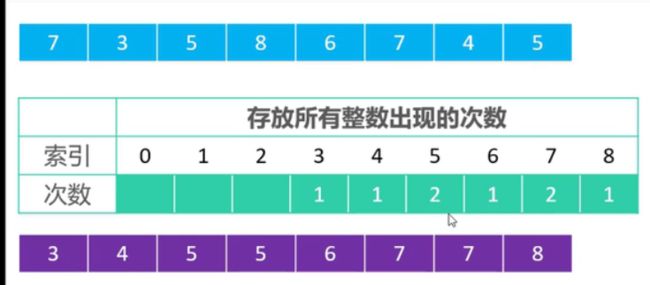计数排序及其改进 C++代码实现与分析 恋上数据结构笔记
文章目录
-
- 复习梗概
- 算法思想
-
- 基础思想
- 改进空间复杂度,改进不能对负数进行排序问题
- 改进稳定性
- 计数排序时间空间复杂度
- 计数排序基础版 代码及输出
- 计数排序第一次改进版 代码及输出
- 计数排序终极版 代码及输出(重要)
- 完整版代码
复习梗概
- 基础算法思想?
- 两种改进的思路?重点在于最终版本思想
- 最终版本是如何做到稳定的?
- 三个数组(array,counts,temp)彼此间的索引和元素的对应关系?
算法思想
基础思想
- 计数排序适合对在一定范围内的整数进行排序
- 先找到排序数组的最大值,创建一个最大索引是该最大值的计数数组,初始值全部为0,然后对排序数组进行计数,若元素i出现了一次,就在计数数组的对应i索引处元素+1,全部计数后,只要按照计数数组的索引(原排序数组的元素)和对应的元素(原排序数组元素出现的次数)按顺序输出索引和对应的元素(即输出原元素和其出现的次数)即可
图片来自网课恋上数据结构与算法,腾讯课堂

改进空间复杂度,改进不能对负数进行排序问题
- 但是如果按照上述实现,会造成三个问题:1.不是稳定排序 2.及其浪费内存空间,前面0到最小值部分都用不上 3.无法对负整数进行排序,因为计数数组索引只能是正数
- 初步改进计数排序:同时查找排序数组的最大值和最小值(max and min),开辟空间为max-min+1的容量的数组,此时排序元素与计数数组的索引的对应关系:计数索引+min,即为原排序元素
- 如下图,为counts数组打印结果,注意索引以及经过+min处理,代表原排序元素

改进稳定性
-
即使经过上面的改进依然不能做到稳定的排序,是因为我们按照 计数数组 的索引与次数 输出排序数组,无论如何都做不到稳定,因为两个相同的元素在 计数数组 的索引中是体现不出来区别的。
-
所以我们从根本上改变了思想,不按照技术数组简单输出,并做出如下改变
-
依然通过max和min创建计数数组,但计数时,把技术数组的次数变为累加值,即 包括自己在内前面所有元素出现次数的累加和 ;这是,如果累加次数值 为8,就意味着该元素在排序数组中 应该排在第8位
-
输出数组时,新定义一个和未排序数组大小相同的数组,因为我们一会要用到未排序数组,所以先备份一个
-
利用未排序数组 和 计数数组,从最右侧向最左侧遍历,遍历到一个元素,先找到其对应在计数数组中的 累加次数值 x(即该元素排序位置),就把其覆盖到备份数组中 x-1的索引处,同时 累加次数值-1(这样若左边还有相同元素,下次就会覆盖到前一个位置,就稳定了)
计数排序时间空间复杂度
- 最好最坏平均时间复杂度:O(n+k)其中n为排序数组长度,k为max-min+1(计数数组长度)
- 空间复杂度O(n+k),来自计数数组和备份数组
- 因为不是比较排序,所以最好最坏平均时间复杂度都一样
- 属于空间换时间的典例
计数排序基础版 代码及输出
比较简单,直接看后面改进版把
void countingSort(vector<int> &array)
{
int max = array[0];
for(int index = 1;index<array.size();index++){
if(max<array[index]){
max = array[index];
}
}
int* counts = new int[max+1]{0};
for(int index = 0;index<array.size();index++){
counts[array[index]]++;
}
vector<int> sortedArray;
for(int index = 0;index <=max;index++){
for(int i = 0;i<counts[index];i++){
sortedArray.push_back(index);
}
}
array = sortedArray;
}
输入数组:
6 9 6 7 5 8 8 29 15 11 10
计数排序基础版
索引 0 1 2 3 4 5 6 7 8 9 10 11 12 13 14 15 16 17 18 19 20 21 22 23 24 25 26 27 28 29
次数 0 0 0 0 0 1 2 1 2 1 1 1 0 0 0 1 0 0 0 0 0 0 0 0 0 0 0 0 0 1
算法用时:(微秒)
[AlgoTime: 6001 us]
排序结果:
5 6 6 7 8 8 9 10 11 15 29
计数排序第一次改进版 代码及输出
void countingSort2nd(vector<int> &array){
//遍历排序数组,记录最大值与最小值
int max = array[0];
int min = array[0];
for(int i = 1;i<array.size();i++){
if(max<array[i]){
max = array[i];
}
if(min>array[i]){
min = array[i];
}
}
//创建计数数组,长度为max-min+1,记住创建数组【】里的是长度,不是最大索引
int *counts = new int[max - min + 1]{0};
//进行计数,以及计数结果显示
for(int i = 0;i<array.size();i++){
counts[array[i]-min]++;
}
//按照计数数组,对array进行重置
int arrayIndex = 0;
for(int i = 0;i<max-min+1;i++){
while (counts[i]-->0)
{
array[arrayIndex] = i+min;
arrayIndex++;
}
}
}
输入数组:
-6 9 6 7 5 8 8 29 15 11 10
计数排序基础版
索引 -6 -5 -4 -3 -2 -1 0 1 2 3 4 5 6 7 8 9 10 11 12 13 14 15 16 17 18 19 20 21 22 23 24 25 26 27 28 29
次数 1 0 0 0 0 0 0 0 0 0 0 1 1 1 2 1 1 1 0 0 0 1 0 0 0 0 0 0 0 0 0 0 0 0 0 1
算法用时:(微秒)
[AlgoTime: 7003 us]
排序结果:
-6 5 6 7 8 8 9 10 11 15 29
计数排序终极版 代码及输出(重要)
void countingSort3rd(vector<int> &array){
//遍历未排序数组,记录最大最小值
int min = array[0];
int max = array[0];
for(int i = 1; i<array.size();i++){
if(min>array[i]){
min = array[i];
}
if(max <array[i]){
max = array[i];
}
}
//定义计数数组,进行计数
int* counts = new int [max -min +1]{0};
for(int i = 0;i<array.size();i++){
counts[array[i]-min]++;
}
//在原有计数数组的基础,对计数值进行累加,把计数值改为 该元素在排序数组中的位置
int locatingNum = 0;
for(int i = 0;i<max-min+1;i++){
if(counts[i] == 0){//如果排序数组中没有这个元素(计数值为0),不进行累加
continue;
}
locatingNum = locatingNum + counts[i];
counts[i] = locatingNum;
}
//打印累加计数数组
countsIndexPrint(min,max);
cout<<endl;
arrayPrint(counts,max-min+1);
//定义临时数组,根据累加计数数组的位置值,从右到左遍历未排序数组,把元素插入到对应位置
int* temp = new int[array.size()];
for(int index = array.size()-1;index>=0;index--){
//array[index]-min = counts数组对应元素索引
//counts[数组对应元素索引] = 数组对应元素在排序序列中的位置
//counts[数组对应元素索引] - 1 = 数组对应元素在排序数组中的索引
temp[counts[array[index]-min]-1] = array[index];
counts[array[index]-min]--;
}
//用备份数组覆盖原数组
for (int i = 0; i < array.size(); i++)
{
array[i]=temp[i];
}
}
输入数组:
-6 9 6 7 5 8 8 29 15 11 10
计数排序终极版
索引 -6 -5 -4 -3 -2 -1 0 1 2 3 4 5 6 7 8 9 10 11 12 13 14 15 16 17 18 19 20 21 22 23 24 25 26 27 28 29
累加次数 1 0 0 0 0 0 0 0 0 0 0 2 3 4 6 7 8 9 0 0 0 10 0 0 0 0 0 0 0 0 0 0 0 0 0 11
算法用时:(微秒)
[AlgoTime: 6000 us]
排序结果:
-6 5 6 7 8 8 9 10 11 15 29
完整版代码
#include 